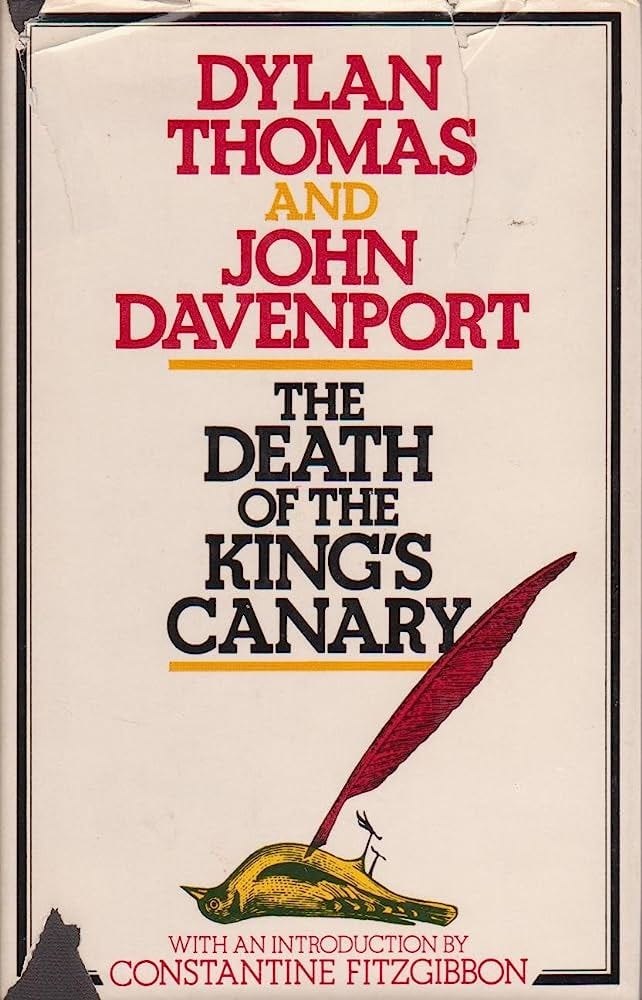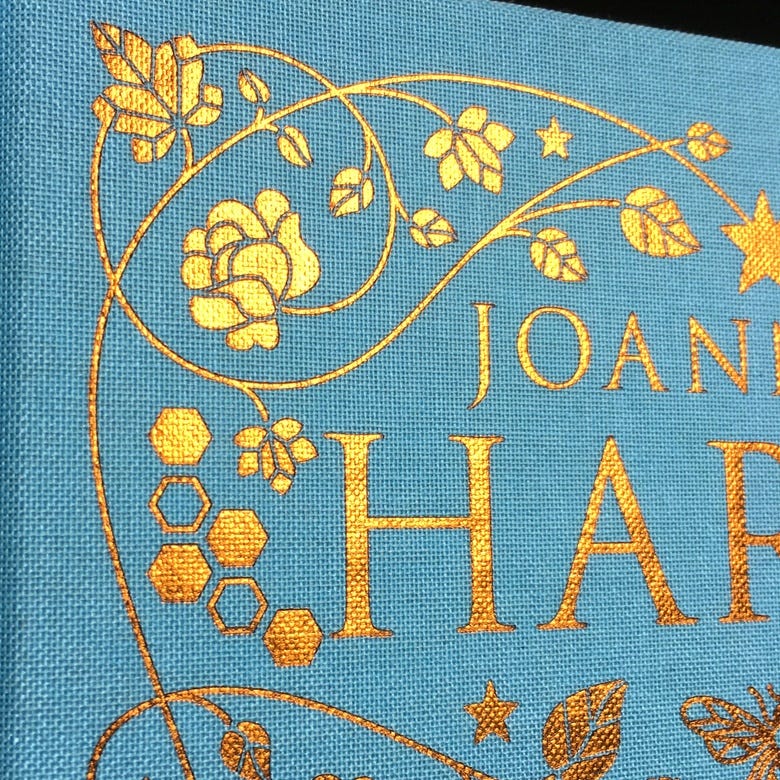The Death of the King’s Canary by Dylan Thomas and John Davenport
Dylan Thomas wrote a detective novel called The Death of the King's Canary. Finished in 1941, it contained so many libellous parodies of the literary establishment (T.S. Eliot, W.H. Auden, George Barker and the Sitwells) that it couldn't be published until 1976, when Dylan and most of those he parodied had died. This should seem strangely familiar to readers of Robert Galbraith’s Strike series...
Dylan’s plans for The Death of the Kings Canary were ambitious. He wrote to Charles Fisher in March 1938:
Murder of the King’s Canary: I’d very much like to do it with you because I’ve got lots of new ideas which I’m too lazy to tell you at the moment. Will it go as a radio play? I’d like to make it, with you, into a novel, make it the detective story to end detective stories, introduce blatantly every character… secret passages etc - that no respectable writer would dare use now, drag hundreds of red herrings, false clues, withheld evidences into the story, falsify every issue, make many chapters deliberate parodies, full of clichés, of other detective- writers.
The collected letters of Dylan Thomas p323
Fisher was called up for war service and Dylan’s partner for the book became the critic and book reviewer John Davenport.
Davenport and I are writing a fantastic thriller together, so I haven’t done o poem for a long time although there are two I want to write badly: both nightmares I’m afraid.
The collected letters of Dylan Thomas p419
The book as completed became more of a parody of people, rather than the detective genre, and according to his introduction, Constantine Fitzgibbon argues that it was ‘quite unpublishable while the main characters were alive’.
Dylan was by all accounts every bit as good a literary mimic as Silkworms Owen Quine.
At the start of the Second World War, Oxford poets such as Sidney Keyes regarded Dylan Thomas as a welcome antidote to Auden and his circle. They invited him to address the University English Club, an undergraduate society, in November 1941. Thomas had been working with John Davenport on a novel, The Death of the King’s Canary, which interwove an unlikely story about the murder of the poet laureate with brilliant parodies of contemporary poets. Philip Larkin noted appreciatively: “Hell of a fine man: little, snubby, hopelessly pissed bloke who made hundreds of cracks and read parodies of everybody in appropriate voices. He remarked, ‘I’d like to have talked about a book of poems I’ve been given to review, a young poet called Rupert Brooke–it’s surprising how he has been influenced by Stephen Spender.’ There was a moment of delighted surprise, then a roar of laughter. Then he read a parody of Spender entitled The Parachutist which had people rolling on the floor.”
Dylan Thomas: A New Life (2004) by Andrew Lycett
The King’s Canary by Joanne Harris
In June 2021, Joanne Harris the author of run away success Chocolat (1999) and chair of the UK’s Society of Authors published a book of short stories called Honeycomb. Within this volume is another tale called The King’s Canary, not a parody this time, but a satire of the career of J. K. Rowling.
In a city of World Beyond, there lived a woman who loved to sing. She was poor; her life was hard, her voice was nothing special, perhaps, but singing was her comfort.
Honeycomb by Joanne M. Harris p308
From the battlements she could hear every word that was spoken below. “Her voice is nothing special,” she heard. “Who on earth does she think she is?”
She heard when other singers came to discuss her intonation. “There are far better singers out there,” they said. “Why did the King even choose her?”
She heard when children cried because she wouldn’t come down to talk to them. “Why won’t she talk to us any more?” they said to their parents. And the parents smiled and said: “She’s far too grand for the likes of us.”
Honeycomb by Joanne M. Harris p309
In the story the Canary grows tired of her gilded cage in the castle, and disguises herself to return to the marketplace to sing (as a satire of Rowling’s Galbraith nom de plume)
More of the onlookers crowded round. The cry went up, half-joy; half-rage. Some of the folk were angry that they had been duped by the woman’s disguise; some were simply overjoyed that their idol was there among them. A fight broke out at the back of the group; someone threw a stone. Someone else pulled at the woman’s headscarf to show the face that everyone knew.
“How dare you pretend to be poor?” they cried.
“How dare you pretend to be ordinary!”
“Please!” cried the woman above the din. “All I want to do is sing!”
But singing was out of the question. The noise of the people was far too loud. And finally, the woman left and went back to her gilded cage, and put on her shoes and her fine new clothes.
But she never sang again.
Honeycomb by Joanne M. Harris p310
Harris and Rowling’s relationship has been troubled for some time. The claim that the Canary’s voice was “nothing special” and that after her identity was revealed “she never sang again” made this satire seem particularly mean to me. While researching this post however I discovered the original blog post including the first draft of this story. This was published on 17th July 2013, just four days after J. K. Rowling was revealed as the author of The Cuckoo’s Calling. The introduction to the post, as well as making the satire explicitly about Rowling, explains that the story was inspired by the many reviews Cuckoo gained on Amazon, by people who had obviously not read the book. The timing also explains to some degree the otherwise bizarre “But she never sang again" ending. If the timing and notes of this blog make me look somewhat more kindly on The King’s Canary, the same can not be said for our next satire.
How The Canary Lost Her Soul by Joanne Harris
On 24th September 2020, Harris published on a twitter thread a new story, later named on her blog How the Canary Lost Her Soul.
The story starts in the same manner as The King’s Canary, but is abbreviated and snarkier:
The King, however, was very pleased with his favourite’s success. He showered her with luxuries: gems and gowns and sweetmeats. But the King’s Canary was not cheered. Gold did nothing to comfort her. Dresses of velvet and lace did nothing to make her feel less afraid. She heard the people in the crowd mocking her, envying her, calling her ugly. She wept in secret in her rooms, and when she sang to an audience, wore makeup so thick and chalky that no-one could see her real face behind the mask of powder.
Singing from her golden cage high above the Palace walls, she saw, not love, but envy and hate in the eyes of those who came to hear, and instead of magic and friendship and love, she began to sing songs of violence and fear, and the hatred of folk for each other.
This time rather than disguising herself, she is approached by a Cuckoo who blames all her troubles on the songbirds:
But all the King’s Canary heard was confirmation of what she believed. The songbirds were violent and rude. The cuckoos were good and reasonable. In time, she found herself singing the dull, repetitive song herself, until her audience was made up of nothing but cuckoos, all singing her song in unison. The Palace servants laughed at her, and called her the King’s Cuckoo. She lost favour of the King, who took away her golden cage and her wardrobe of silks and ermines, and moved her into new quarters near the latrines. People even began to whisper that she had lost her soul to this new and cruel obsession.
“See how the songbirds attack you too,” said the cuckoos. Indignantly, the King’s Cuckoo agreed.
But if she had been listening, she would have realized that all the songbirds were already gone, and all that was left in the Kingdom was the mindless call of the cuckoos.
Joanne Harris has never publicly claimed this is a satire of her gender criticism, but for me it is a clear reaction to J. K. Rowling’s tweet in support of Maya Forstater in December 2019. Indeed as late as last year, she had claimed never to have attacked Rowling.








I totally agree with Micah Elizabeth regarding the jealousy, etc of Harris and I love the story Chocolat or at least the movie version with the fabulous music. It's so disappointing! I'm also irritated that she ascribes her venomous stories to bees who are way too busy working at keeping the world eating and have no time for shameful slander.
But this whole nasty business made me wonder about canaries and cuckoos. For instance 95% of singing canaries are male, not female. And cuckoos lay their eggs in other birds' nests and then kick out any hatchlings from the other bird. So I wonder if Harris laid her Honeycomb "egg" in a Dylan Thomas nest?
Whatever. The point is good job Nick for bringing all this into the light. Well done.
I was not aware of the Canary satire prior to reading this article, but it certainly doesn’t make me feel any fondness for Harris. It reeks of jealously, meanness, and a dull mind.